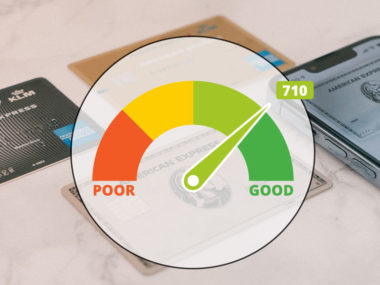Finances can be a source of contention in a marriage. When you are trying to make plans or even set goals, it’s concerning if you or your spouse has bad credit. This conversation may not be fun, or joyful, but being aware of what steps to take will improve the process.
Table of Contents
Can My Bad Credit Affect My Spouse?
Yes, once you are legally married, your bad credit can affect your spouse. In reality, you and your significant other will still have your own personal credit score independent of each other. While your credit reports do not automatically merge when you become married — unless you open a joint bank account — if you go to purchase a big-ticket item like a car or home, your bad credit can negatively impact what you can be approved for and what your rates look like.
When you get married, you become a package deal in a lot of ways, so you may think a way around this problem is to apply for loans individually. You can do this, technically, but you’re putting yourself at risk in case of divorce. A judge may name you solely liable for any debt in your marriage that is only under one name.
If a judge does demand your ex-spouse pay for a portion but they fail to comply, it will affect your credit score and not theirs. You’ll have to decide together how to handle these situations. Perhaps you wait for your credit to improve, you decide to utilize a cosigner, or you apply for a loan independently — there are other options depending on what each of you is most comfortable with.
How to Deal With a Spouse With Bad Credit
In order to combat the issues that come with one-sided poor credit in a marriage, it’s important to be open and transparent about it. Fortunately, poor credit and poor income are different, so poor credit is not irreversible. It’s valuable to know how credit history affects both parties involved. Make a plan to repair credit and use preventative measures to ensure that you don’t run into this problem again in the future.
Making a Plan
It’s important to make a comprehensive plan to improve your spouse’s credit score. First, find the root of their credit score problems. The main causes for poor credit include:
- Late payments;
- Defaulting on payments;
- Payments going to collections;
- Defaulting on a loan;
- Bankruptcy;
- Foreclosure.
Why was your spouse missing payments and spending so much money? If it’s a spending issue, focus on finding and fixing their bad spending habits. Have an open and honest discussion about their finances and how they felt they went wrong and work to correct them. The difference between positive and negative credit might not have to do with financial missteps but might have to do with a large-scale financial emergency. Either way, it’s important to discuss this in order to mitigate the issue.
Once you’ve discovered the source of their poor credit, make a plan to correct it. If you’re turned down for a loan because your spouse has poor credit, sometimes all it takes is a conversation with a loan officer and a plan for improving a credit score to prove your eligibility for a loan. Your plan should include:
- Creating a dual budget that blends your finances together;
- Making payments on time;
- Making payment plans to pay off all existing debt;
- Utilizing a credit card responsibly;
- Checking back consistently.
Building back credit is not a fast process, but it’ll happen with good financial habits and patience. In the meantime, you may have to live a little more frugally and wait to get a great loan — but the sacrifice will pay off in the end. As long as you’re being proactive about the next steps toward improving credit, you’re on the right track.
Taking Precautions
Along with making a plan to improve credit comes the need to take precautions so that your credit — or your spouse’s credit — doesn’t take another dive. Having an awareness of your finances and the dangers involved with defaulting on a loan or missing payments will, in itself, help to improve your overall financial health.
Take precautions so that you aren’t completely drowning in case of a financial emergency by always saving money in an emergency fund. Talk to your banker about how to improve credit and what you should avoid doing. Knowing what not to do is just as important as knowing what to do.
- Don’t open too many new accounts; the average age of your account is important in determining your credit score;
- Don’t close too many accounts; this erases long-term accounts and increases your debt-to-credit ratio;
- Don’t sign up for a lot of incentive programs; too many requests for credit info will ding your credit score;
- Don’t use your credit too much; credit cards shouldn’t fund daily expenses, and you should aim to keep your credit utilization around 30% or less of your limit.
You want to have enough credit history for credit reporting agencies to get an idea of your financial habits without a plethora of accounts that have a negative effect on your overall credit health. Having a few loans, a few credit cards, and paying on them religiously is the way to keep your credit in a good place. Just take precautions so that you don’t run into overspending habits or a sudden loss in funds that causes an inability to pay your bills.
If your credit score is better than your spouse’s, it’s not the end of the world; it’s just the beginning of a plan to improve yourselves. Understanding financial literacy alongside implementing strategies for short- and long-term goals is key in a marriage where your assets will be blended. Taking action and improving your credit score will be a valuable step towards that journey.
Image source: https://pixabay.com/





